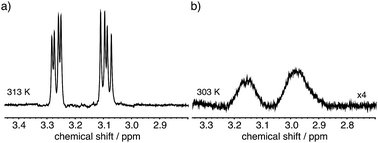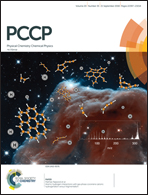Nuclear spin singlet states as magnetic on/off probes in self-assembling systems
Abstract
Self-assembling processes occur in a variety of compounds such as peptides, proteins and DNA. These processes have been linked to pathologies and have as well been exploited for designing responsive contrast agents for disease detection. Novel methods to investigate and detect self-assembly therefore hold promise to obtain more insights into disease progression or open pathways to the design of novel self-assembling materials. In this article we are introducing nuclear singlet states to probe self-assembly in the dipeptide isoleucine–phenylalanine (IF) as a thermoresponsive on/off switch for nuclear magnetic resonance (NMR). We have investigated the relaxation and singlet state properties of the β-protons of phenylalanine in the IF dipeptide in aqueous solutions. At IF concentrations of 2 wt% and above 308 K, a long lived nuclear singlet state, as compared to the longitudinal relaxation, was observed. At 308 K the dipeptide starts forming a gel and no singlet state is accessible at lower temperatures. Upon heating, the gel disassembles and an isotropic liquid forms making the singlet state accessible again. This demonstrates the thermoresponsive on–off character of the nuclear spin singlet state in the IF dipeptide.

- This article is part of the themed collection: 2018 PCCP HOT Articles


 Please wait while we load your content...
Please wait while we load your content...